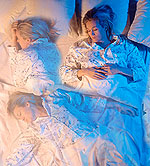Too Much, Too Little Sleep Linked to Stroke Risk
Postmenopausal women who slept more than nine hours a night had up to 70% higher risk.
By Ed Edelson
HealthDay Reporter
|
E-mail this article
Subscribe to news
Printer friendly version
|

(SOURCES: Jiu-Chiuan Chen, M.D., Sc.D., assistant professor of epidemiology, University of North Carolina School of Public Health, Chapel Hill; Adnan I. Qureshi, professor of neurology, neurosurgery and radiology, Univerity of Minnesota Medical School, Minneapolis; Sylvia Wassertheil-Smoller, Ph.D., head, division of epidemiology, Albert Einstein College of Medicine, New York City; July 18, 2008, Stroke, online)
THURSDAY, July 17 (HealthDay News) -- Sleeping either too much or too little appears to heighten the risk of stroke, a new study finds.
And while the researchers said their findings can be applied only to the postmenopausal women in the study, other experts said the same relationship between sleep and stroke risk seems to be universal.
The study of more than 93,000 women found that those who regularly slept more than nine hours a night had a 60 percent to 70 percent higher risk of stroke than women sleeping seven hours.
The risk of stroke was 14 percent higher for women who regularly slept six hours or less, compared to those sleeping seven hours a night.
The study, to be published online July 18 in the journal Stroke, was led by Dr. Jiu-Chiuan Chen, an assistant professor of epidemiology at the University of North Carolina School of Public Health.
A number of studies have documented adverse effects of sleep deprivation, Chen said, and this report adds to that evidence.
"There have also been many studies showing a link between abnormally long sleep and an increased risk of cardiovascular disease and high blood pressure," he said.
Similar findings have been seen in studies of other groups of people, said Dr. Adnan I. Qureshi, professor of neurology, neurosurgery and radiology at the University of Minnesota Medical School, who has done some of those studies.
"If you sleep too much or sleep too little, it seems your risk of stroke goes up," said Qureshi. "This is not explained by traditional risk factors such as cholesterol levels or high blood pressure."
It isn't clear why sleep affects stroke risk, but there are several possible explanations, he said. One is that people who report long hours of sleep may have "ineffective sleep," because their periods of sleep are broken up by unnoticed wakenings, sometimes due to the breathing disorder called sleep apnea.
"Or you may be looking at a psychosocial profile," Qureshi said. "People who have depression tend to sleep longer."
As for too-brief sleep, "in experimental models, it has been shown that if you do not get enough sleep, the risk that you will die increases," he said. "Both sleep and the quality of sleep are important for survival."
There might be some factors specific to postmenopausal women, said Sylvia Wassertheil-Smoller, head of the division of epidemiology at Albert Einstein College of Medicine in New York City.
"Women who sleep less than six hours, all kinds of things happen to the hormonal system," she said. "Lots of studies clearly show that it is detrimental, that lots of stress hormones get released."
And sleeping longer than normal might be related to depression, Wassertheil-Smoller said, in agreement with Qureshi.
"People who are depressed tend to sleep longer," she said. "Depression is related to an increased risk of cardiovascular disease and stroke."
Simply setting the clock to sleep an allotted amount of hours is not a solution to the problem, Wassertheil-Smoller said. "If a woman is not sleeping long enough, she can try stress reduction and other methods to get more sleep," she said. "If a woman is habitually sleeping more than nine hours, she can discuss it with her doctor. She should also act to lower the known risk factors for stroke, especially high blood pressure."
More information
To learn more about the importance of sleep, visit the National Sleep Foundation. 
Copyright © 2008 ScoutNews, LLC. All rights reserved. 
HealthDayNews articles are derived from various sources and do not reflect federal policy. healthfinder.gov does not endorse opinions, products, or services that may appear in news stories. For more information on health topics in the news, visit the healthfinder.gov health library.